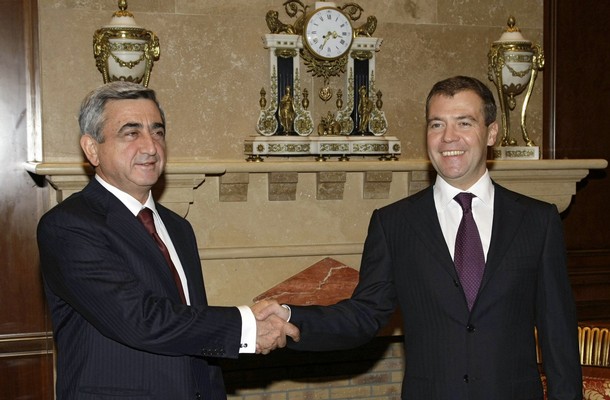
From Andrei Trenin and Dmitri Trenin, Radio Free Europe/Radio Liberty: Russian President Dmitry Medvedev and Armenian President Serzh Sarkisian signed a protocol last week prolonging the two countries’ 1995 bilateral defense treaty. While the protocol is deemed a mere prolongation of the existing treaty, there are important new features.
First, Russia undertakes to guarantee Armenia’s territorial integrity in its entirety, and not just its borders with Turkey and Iran, as before. This pledge is already contained in the current Russian military doctrine, which calls an attack on any member of the Moscow-led Collective Security Treaty Organization (CSTO) an attack on all. Azerbaijan, which talks about using all means necessary to restore control over Nagorno-Karabakh, is being put on notice: war against Armenia is not an option.
Second, Russia is signaling it is not about to leave anytime soon. The treaty with Armenia has been extended through 2044. This is becoming a trend: earlier this year, Ukraine agreed to host the Russian Black Sea Fleet through 2042. Russian strategists are beginning again to think in the long term. Some analysts believe this trend will continue in Moldova. From Moscow’s perspective, however, it is crucial to consolidate a military presence in Kyrgyzstan and Tajikistan, Central Asia’s two fragile states sharing the potentially explosive Ferghana Valley and situated too close for comfort to Afghanistan.
Thus, Russia is busy creating a security system around its perimeter. All his differences with Moscow notwithstanding, Belarusian President Alyaksandr Lukashenka has recently dropped his objections to chairing the CSTO. Two years after the war with Georgia, Russia has become entrenched militarily in Abkhazia and South Ossetia. It has also intensified contacts with Ukraine and Moldova, neither of which belongs to the CSTO. And next month, Medvedev is due in Baku.
Dmitri Trenin is director of the Carnegie Moscow Center. His son, Andrei, is an independent security and energy analyst. (photo: Getty) (via Global Europe)
Image: getty%208%2026%2010%20Serzh%20Sarkisian%20Dmitry%20Medvedev.jpg
